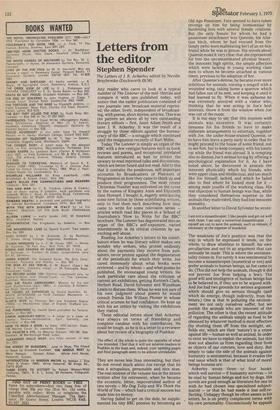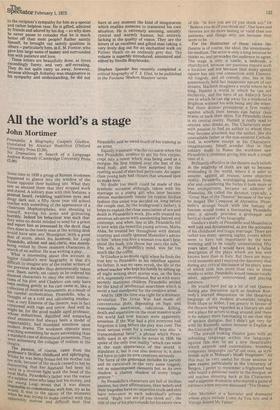Letters from the editor
Stephen Spender
The Letters of J. R. Ackerley edited by Neville Braybrooke (Duckworth E9.50) Any reader who cares to look at a typical number of The Listener of the mid-'thirties and compare it with one published today, will notice that the earlier publication consisted of two journals: one, broadcast material reprinted; the other, lively, independent of broadcasting, with poems, short stories, articles. This was the pattern set above all by two outstanding literary editors first, Janet Adam Smith and later J. R. Ackerley. It was the result of a struggle by these editors against the bureaucracy of the BBC a struggle which continued until the resignation recently of Karl Miller.
Today The Listener is simply an organ of the BBC with a few vestigial features such as book reviews and poems, and occasional unrelated features introduced as bait to attract the unwary to read reprinted talks and discussions, which are better heard and not read. Add to this that it contains the ponderous, self-important accounts by Broadcasters or Planners of Programmes on how they came to think up and produce their programmes. The most recent Christmas Number was enlivened on the cover by the names of Kingsley Amis and Elizabeth Jane Howard. I bought it, eagerly anticipating some new fiction by these scintillating writers, only to find them each describing how they came to write for some television series articles which read like pieces in a School of Journalism's 'How to Write for the BBC' brochure. The Listener has degenerated into an organ of the BBC's self-exposure, varied intermittently in its critical columns by unexciting self-abuse.
Reading Joe Ackerley's letters to his contributors when he was literary editor makes one wonder why writers, who protest endlessly about the payments they receive from publishers, never protest against the degeneration of the periodicals for which they write. Joe cared immensely about what books were reviewed and by whom and what poems he published. He encouraged young writers. He took particular care about the criticism of current art exhibitions, getting Kenneth Clark, Herbert Read, David Sylvester and Wyndham Lewis to discuss them. When he was not sure of his own judgment about poems he would consult friends like William Plomer in whose critical acumen he had confidence. He kept up with his art critics by visiting the exhibitions they visited.
These editorial letters show that Ackerley was always on terms of friendship and complete candour with his contributors. He could be tough, as he is in a letter to a reviewer about her review of a biography of Pushkin:
The effect of the whole is quite the opposite of what you intended. I feel that it will not interest readers in Pushkin in the least and, indeed, your opening pages and final paragraph seem to be almost unreadable.
They are never less than interesting, but they ao not reveal much about Joe except that he was a scrupulous, personable and nice man. The real interest of the volume lies in the letters written after his retirement, when he became the eccentric, bitter, impoverished author of two novels My Dog Tulip and We Think the World of You which had a critical success but made him no money.
Having failed to get on the dole, he supplemented his tiny BBC pension by becoming an Old Age Pensioner. Fate seemed to have taken revenge on him for being homosexual by burdening him with several female i elations. But the only female for whom he had a passionate attachment was Queenie, his Alsatian bitch, whom he had rescued from the family (who were maltreating her) of an ex-boy friend while he was in prison. His novels about Queenie make it very clear that she represented for him the uncontaminated physical beauty, the innocent high spirits, the simple affection which were tacking in young working class men to whom he became attached at various times, previous to his adoption of her.
After Queenie's demise, he became ever more solicitous for animals, nursing a seagull with a wounded wing, taking home a sparrow which had fallen out of its nest, and keeping it until it had learned to fly. When it was airborne he was extremely annoyed with a visitor who„ thinking that he was acting in Joe's best interests, threw it from the window when Joe was out of the room.
It is too easy to say that this concern with animals was excessive. It was certainly tiresome for his friends to have to make elaborate arrangements to entertain, together with Joe, the under-house-trained Queenie, or to have him leave a party early in order that he might proceed to the house of some friend, not to see him, but to keep company with his lonely cat while the friend was abroad. It is tempting also to dismiss Joe's animal loving by offering a psychological explanation for it. As I have noted above, he discovered in animals the innocent physicality which his friends, who were upper class and intellectual, and too much like Joe himself, lacked, and which he failed also to find where he looked most for it among male youths of the working class. His real objection to human beings was that, while they considered themselves superior to the animals they maltreated, they had lost innocent animality.
In another letter to David Sylvester he wrote:
I am not a misanthropist: I like people and get on well with them: I am only a numerical misanthropist ... I myself am out to save the animals, such as remain; if necessary at the expense of mankind.
The weakness of Joe's position was that the way in which he expressed it tends, on the whole, to draw attention to himself, his own peculiarities and not to an argument that can seriously be made. This is where the sentimentality comes in. For surety it was sentimental to become a misanthropist (numerical or not) and prefer animals to human beings, as Joe came to do. (This did not help the animals, though it did not prevent Joe from helping a few). The good will and intelligence of human beings has to be believed in, if they are to be argued with. And Joe had two grounds for serious argument which should give us serious thought (and which do emerge, though indirectly, from his letters.) One is that in polluting the environment we not only ourselves suffer, but we punish the animals who are innocent of the pollution. The other is that the recent attitude of regarding the animals simply as food to be obtained by whatever method is most effective (by shutting them off from the sunlight, air, fields etc, which are their 'nature') is a crime against life human as well as animal. In order to exist we have to exploit the animals, but this does not absolve us from regarding their lives as objects of our concern, love and duty. But simply to take the side of the animals against humanity is sentimental, because it evades the real issue which is that of what kind of moral beings humans are.
Ackerley wrote three or four books which will survive if humanity survives to be read by human beings and not by dogs. His novels are good enough as literature for one to wish he had chosen less specialised subjectmatter or that he had made it less self-reflecting. Unhappy though he often seems in his letters, he is on pretty complacent terms with his own personality. Unconsciously he appeals to the recipient's sympathy for him as a special and rather helpless case. He is gifted, admired by friends and adored by his dog — so why does he never pause to consider that he is much better off than most people? Rather saintly himself, he brought out saintly qualities in others — particularly here, in E. M. Forster, who gave him large sums of money and surrounded him with patience and love.
These letters are beautifully done, at times exceedingly funny, and very self-revealing. They do not quite carry us away, however, because although Ackerley was imaginative in his sympathy and understanding, he did not have at any moment the kind of imagination which enables someone to transcend his own situation. He is extremely amusing, amiably cynical and warmly human, but entirely lacking in the quality of vision. They are the letters of an excellent and gifted man taking a very lively dog out for an enchanted walk on Putney Heath on an endlessly grey day. The volume is superbly introduced, annotated and edited by Neville Braybrooke.
Stephen Spender has recently completed a critical biography of T. S. Eliot, to be published in the Fontana 'Modern Masters' series



































 Previous page
Previous page